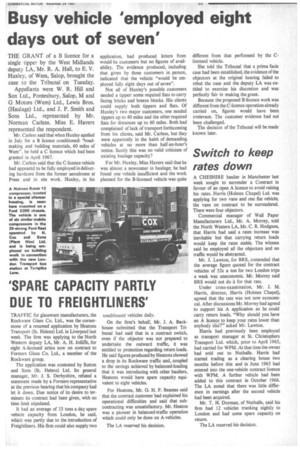Busy vehicle 'employed eight days out of seven'
Page 35

If you've noticed an error in this article please click here to report it so we can fix it.
THE GRANT of a B licence for a single tipper by the West Midlands deputy LA, Mr. R. A. Hall, to E. V. Huxley, of Wem, Salop, brought the case to the Tribunal on Tuesday.
Appellants were W. R. Hill and Son Ltd., Pontesbury, Salop, M and G Motors (Wem) Ltd., Lewis Bros. (Haulage) Ltd., and J. P. Smith and Sons Ltd., represented by Mr. Norman Carless. Miss E. Havers represented the respondent.
Mr. Carless said that when Huxley applied in July for a B licence conditioned: "roadmaking and building materials, 60 miles of Wem", he held a C licence which had been granted in April 1967.
Mr. Carless said that the C-licence vehicle had appeared to be fully employed in delivering hardcore from the former aerodrome at Prees and in site work. Huxley, in his application, had produced letters from would-be customers but no figures of availability. The evidence produced, including that given by three customers in person, indicated that the vehicle "would be employed fully eight days out of seven".
Not all of Huxley's possible customers needed a tipper: some required fiats to carry facing bricks and breeze blocks. His clients could supply both tippers and flats. Of Huxley's two major customers, one needed tippers up to 40 miles and the other required flats for distances up to 60 miles. Both had complained of lack of transport forthcoming from his clients, said Mr. Carless, but they were apparently in the habit of demanding vehicles at no more than half-an-hour's notice. Surely this was no valid criticism of existing haulage capacity?
For Mr. Huxley, Miss Havers said that he was almost a newcomer in haulage; he had found one vehicle insufficient and the work planned for the B-licensed vehicle was quite different from that performed by the Clicensed vehicle.
She told the Tribunal that a prima facie case had been established, the evidence of the objectors at the original hearing failed to rebut the case and the deputy LA was entitled to exercise his discretion and was perfectly fair in making the grant.
Because the proposed B-licence work was different from the C-licence operation already carried on, figures would have been irrelevant. The customer evidence had not been challenged, The decision of the Tribunal will be made known later.












































































































































